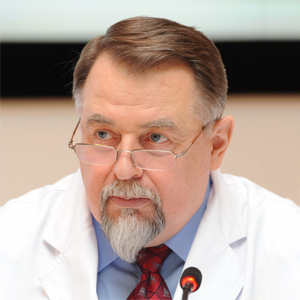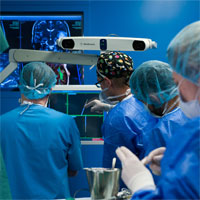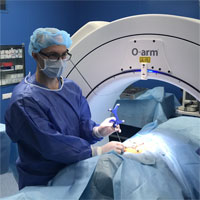Chief of the department: Zuev Andrey Alexandrovich, neurosurgeon of the highest category, assistant professor, Ph.D.
In the Department of Neurosurgery of the Pirogov National Medical and Surgical Center, up to 2000 operations for diseases of the brain and spinal cord, spine, brain vessels, and peripheral nervous system are performed annually.
Our neurosurgeons use the latest advances in medicine, perform robot-assisted, minimally invasive, endoscopic spinal surgeries, awake brain surgery, deep brain stimulation, surgical treatment of epilepsy, as well as reconstructive and hybrid interventions on the brain and spinal cord and peripheral nerves.
Proper treatment
Successful treatment begins with the correct diagnosis. The capabilities of the Pirogov National Medical and Surgical Center allow high-precision neuroimaging, neuro-functional, laboratory, and morphological diagnostics, to develop individual treatment and rehabilitation tactics depending on the volume of interventions and associated diseases.
One of the specializations of the Department of Neurosurgery is the surgery of functionally significant areas of the brain. Collaboration of leading neurosurgeons and neuro-linguists allows to gently operate patients with tumors located in the area of speech centers of the brain.
The most actively developing area in our department is the surgery of pharmaceutical-resistant forms of epilepsy. On the basis of the department there is a laboratory of round-the-clock video EEG monitoring, invasive EEG diagnostics (installation of stereo EEG electrodes).
Read more about the laboratory for the diagnosis and treatment of epilepsy
In the department, spinal neurosurgery is developed at the most modern level: we successfully use both minimally invasive techniques (operations using endoscopic techniques, special dilators, installed through a small puncture), and perform extensive reconstructive interventions on the spine in an open way. Maximum safety during operations is ensured by the use of
It can rightly be considered that the Department of Neurosurgery has the most extensive experience in Russia in the treatment of syringomyelia of various origins.
Our team constantly improves its knowledge and skills, regularly undergo internships at leading foreign clinics (Germany, France, Belgium, Italy, Japan, USA, Austria, England, China, Switzerland, Finland, etc.), perform at All-Russian and international forums, publish articles in reputable medical publications.
Research activities are underway on the treatment of pharmaceutical-resistant forms of epilepsy, syrinogomyelia, Arnold-Chiari abnormalities, degenerative diseases of the spine, tumors of functionally significant areas of the brain and spinal cord tumors and chronic pain.
Turning to us for help, you can be sure that the whole team will be as focused as possible on the success of your treatment.
We have highly qualified nurses. They not only carry out appointments of doctors with the maximum professionalism, but also are very delicate people, which is important, as they are in constant contact with patients at all stages of their inpatient treatment.
The department is equipped with the flagship products of medical engineering, which makes it possible to promptly treat almost any neurosurgical pathology.
Employees use two newest operating microscopes compatible with neuronavigation, two neuronavigation stations, endoscopic racks, the only ROSA robotic system in Russia, intraoperative CT navigation, a device for multimodal neurophysiological monitoring, high-field magnetic resonance (3 T), epilepsy laboratory with the possibility of multi-day EEG monitoring and much more.
What diseases should be treated by a neurosurgeon
Diseases of the brain and skull
- Tumors of the brain, meninges and skull bones (gliomas, meningiomas, teratomas, epindymomas, craniopharyngiomas, osteomas, chordoma, etc.);
- Hydrocephalus;
- Pituitary adenomas;
- Pharmacoresistant epilepsy;
- Defects of the bones of the skull of any complexity and localization;
- Anomaly Arnold-Chiari;
- Strokes — hemorrhagic and ischemic;
- Hematomas (epidural, subdural, intracerebral).
Diseases of cerebral vessels and pre-cerebral arteries
- Arterial aneurysms of various localization;
- Arteriovenous malformations (AVMs);
- Arteriovenous fistula;
- Angiomas;
- Stenosis and occlusion of the carotid and vertebral arteries;
- Stenosis and occlusion of the proximal segments of the subclavian arteries with the formation of vertebral-subclavian stealing;
- Stenosing diseases of the arteries of the brain.
Diseases of the spine and peripheral nervous system
- Degenerative dystrophic diseases of the spine;
- Herniated intervertebral disc of all spine segments;
- Spinal stenosis;
- Spinal injuries and their consequences;
- Inflammatory diseases of the spine;
- Spinal deformities;
- Neoplasms of the spine and spinal cord;
- Syringomyelia of various etiology and localization;
- Tunnel syndromes of any localization;
- Peripheral nerve tumors;
- Post-traumatic and compression neuropathies;
- Pain syndromes of various localization;
- Spastic syndrome;
- Parkinson’s disease.
Contact Information
Address: 105203, Moscow, Nizhnyaya Pervomayskaya str., 70
Contact phone number:
Fax:
How to reach us by using public transport
“Pervomaiskaya” metro station (last carriage of the train out of the city centre). From “Pervomaiskaya” metro station by any tram or trolley bus go to the stop “15th Parkovaya Street”. Go along the 15th Park Street to the intersection with the Nizhnyaya Pervomaiskaya Street, turn left and walk about a hundred meters to the entrance of the Pirogov National Medical and Surgical Center.














